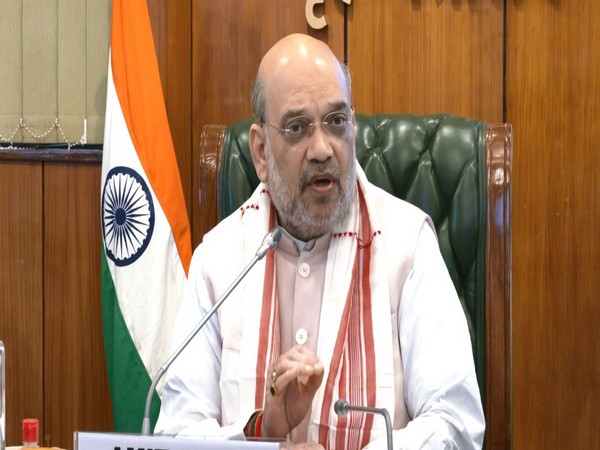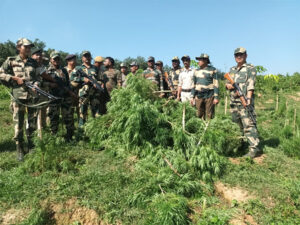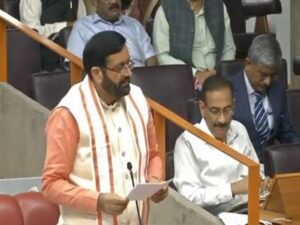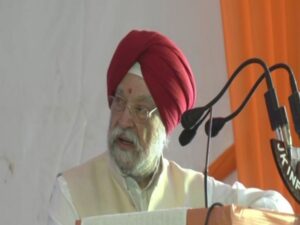
New Delhi [India], September 19 (ANI): The central government on Monday notified the rules under the Criminal Procedure (Identification) Act, 2022 which empowers police to obtain physical and biological samples of convicts and those accused of a crime.
The Act authorises a police officer or a prison officer of the Central government, state government or Union territory administration, authorised by the National Crime Records Bureau (NCRB) and the units under its control, to access the information containing the record of finger impressions, palm print impressions, foot print impressions, photographs, iris and retina scan, physical, biological samples and their analysis, behavioural attributes including signatures, handwriting or any other examination referred to in section 53 or section 53A of the Code of Criminal Procedure, 1973 (2 of 1974).
“In exercise of the powers conferred by section 8 of the Criminal Procedure (Identification) Act, 2022 (11 of 2022), the Central Government hereby makes the rules, namely Criminal Procedure (Identification) Rules, 2022.
The Act authorises police to take measurements (finger impressions, palm print impressions, footprint impressions, photographs, iris and retina scan, physical, biological samples and their analysis, behavioural attributes including signatures, handwriting or any other examination referred to in section 53 or section 53A of the Code of Criminal Procedure, 1973) of a person arrested in connection with an offence under Chapter IXA or Chapter X of the Indian Penal Code, 1860 (45 of 1860).
But the Act made it clear that the authorisation should have prior written approval of a Police officer not below the rank of Superintendent of Police. “Provided further that the measurements of a person charged with violation of any prohibitory order issued under section 144 or section 145 or arrested under section 151 of the Code of Criminal Procedure, 1973 (2 of 1974) shall not be taken unless such person is charged or arrested in connection with any other offence punishable under any other law for the time being in force,” the notification, which lays down the rules under the Act, reads.
It also mentions that the measurements of a person shall not be taken on the “initiation of proceeding under section 107 or section 108 of section 109 or section 110 of the Code unless such person has been ordered to give security for his good behaviour or maintaining peace under section 117 of the Code for a proceeding under the said sections”.
The NCRB shall issue the Standard Operating Procedures for taking the measurements, which may include the following, specifications of the types of equipment or devices to be used for taking measurements; specifications and the format, including digital or physical, of the measurements to be taken; method of handling and storage of measurements in the database at the level of State Government or Union territory Administration in a format compatible with the database of the Bureau; and information technology system to be used for taking of measurements.
It also states that the state government or Union territory Administration using its own information technology system shall provide compatible application programming interfaces for sharing the measurements of record of measurements with the NCRB.
If any person who is required to allow the measurements to be taken under the Act resists or refuses to allow the taking of such measurements, the authorised user shall take the measurements in accordance with the provisions of sections 53 and 53A of the Code of Criminal Procedure, 1973 (2 of 1974), it further said.
The record of measurements shall be stored and preserved in a secure and encrypted format as specified in the Standard Operating Procedures, reads the Act. “In case any measurement is collected in physical form or in a non-standard digital format, it shall be converted into standard digital format and thereafter uploaded in the database as per the Standard Operating Procedures.”
“Any request for destruction of record of measurements shall be made to the Nodal Officer to be nominated by the respective State Government or Union territory Administration or Central Government, as the case may be, concerned with the criminal case in which the measurements were taken. The request for destruction of the record of measurements shall be recommended by the Nodal Officer to the NCRB after verifying that such record of measurements is not linked with any other criminal cases,” as per the act.
Any act of unauthorised access, distribution or sharing of data collected under the Act shall be punishable as per the provisions of the Indian Penal Code, 1860 and the Information Technology Act, 2000. The State Government or Union territory Administration or the law enforcement agency of the Central Government shall cause its authorised user to comply with the Standard Operating Procedures. (ANI)












